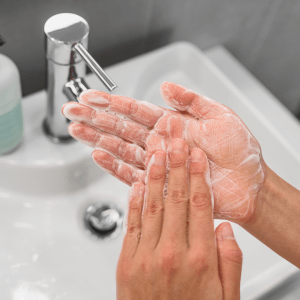National Handwashing Awareness Week: Infection-Prevention Playbook for Healthcare Teams

Key Facts:
- Effectiveness: Proper handwashing can cut respiratory illnesses by 16–21% and diarrheal disease by up to 40% (CDC).
- Compliance Gap: Average hand-hygiene adherence among U.S. healthcare workers hovers around 50%.
- Cost Impact: Each HAI adds roughly $38K to a patient’s stay; nationwide, HAIs cost $28–33 B annually (AHRQ).
- Five Moments: WHO’s Five Moments for Hand Hygiene remain the global gold standard for clinical settings.
Editor's Note
This article is part of the BHM Healthcare Awareness Series, designed to provide quick, ready-to-use content and links to official resources for internal staff communications, patient education, and social media.
Feel free to copy, adapt, and share.
Observation Date
December 7 – 13
History & Impact
First promoted in 1999 by the non-profit Henry the Hand Foundation, and now championed by the CDC’s Clean Hands Count campaign, National Handwashing Awareness Week spotlights proper hand hygiene as the simplest, most cost-effective way to curb healthcare-associated infections (HAIs). Hospitals, schools, and community groups observe the week through demonstrations, policy refreshers, and social media challenges (#WashUp).
Why it Matters
- Up to 70% of HAIs are preventable; hand hygiene remains the cornerstone of every infection-prevention program.
- For executives, strong compliance protects quality ratings, reimbursement, and brand trust.
- For frontline teams, clear “when & how” guidance reduces outbreaks, absenteeism, and antibiotic use.
Quick Actions for Your Organization
For Leadership
Mandate electronic or observer-based hand-hygiene audits; publish unit-level scorecards quarterly.
Tie incentive programs or value-based bonuses to ≥ 90% compliance.
Join the CDC Clean Hands Count Pledge and spotlight progress in board reports.
For Implementation Teams
Stage glow-germ demonstrations during staff huddles.
Refresh dispenser placement: Ensure the alcohol rub is within 3 feet of every patient room entrance.
Run a “20-Second Scrub” social challenge with short reels from diverse staff roles.
Resources
Ready-to-Use Assets
The following links provide resources & information for creating internal or external campaigns to support or promote this healthcare observance. Please vet these resources for alignment with your organization.

Talking Points
Copy & Paste Friendly
“Hand hygiene is your superpower—wash with soap for 20 seconds and stop germs before they spread. #NationalHandwashingWeek”
“Clean Hands Count! Help us hit 90% compliance by scrubbing in at every ‘Five Moments’ this week.”
“Leaders & teams: grab CDC and WHO toolkits for ready-made posters, audits, and staff challenges.”
Disclaimer: Please verify all information, usage rights, and related guidelines with the official observance organizers and your organization’s policies to ensure proper alignment.
Frequently Asked Questions (FAQ)
Q1. How often should compliance be audited?
Most systems target monthly audits with real-time feedback; high-risk units may require weekly checks.
Q2. Which metrics should we track to show a National Handwashing Awareness Week campaign’s impact beyond compliance rates?
Pair hand-hygiene compliance % with HAI incidence, dispenser refill volumes, staff sick-day trends, and digital engagement (intranet clicks, QR-code scans). Present a pre-/post-comparison to demonstrate ROI.
Q3. How can we engage non-clinical departments (IT, Facilities, HR) in the observance?
Invite each department to “adopt” a unit for friendly competition, co-create short videos demonstrating proper technique, and add hand-hygiene reminders to email signatures and digital signage across campuses.
Partner with BHM Healthcare Solutions
With over 20 years in the industry, BHM Healthcare Solutions is committed to providing consulting and review services that help streamline clinical, financial, and operational processes to improve care delivery and organizational performance.
We bring the expertise, strategy, and capacity that healthcare organizations need to navigate today’s challenges – so they can focus on helping others.
Are you ready to make the shift to a more effective process?
